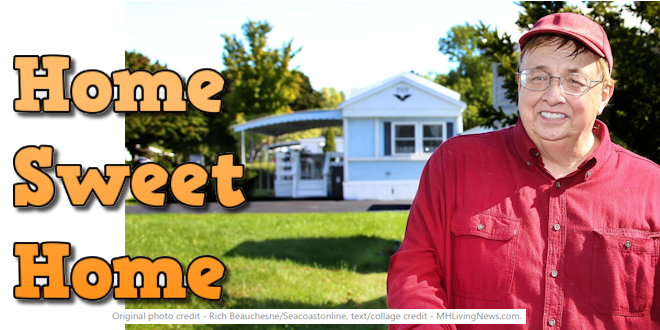According to a study by Southeast Research, a Professional Researcher Certified operation, 97 percent of the owners of new manufactured homes described their home as attractive. And 45 percent of those buyers could have purchased a conventional, site-built house, but decided to buy a manufactured home instead.
That’s good news for those shopping for a quality, greener and affordable home.
But you might never know those facts if you listened to a recent National Public Radio (NPR) report (see link here) on manufactured homes and community living.

The NPR report focused on a serious water quality problem at Syringa Mobile Home Park, in Moscow, Idaho. The correspondent, Daniel Zwerdling admits to focusing on that one instance of no- or poor-water that lingered for years in that community. Zwerdling said, “But Syringa shows that the legal and financial ways that mobile home communities are set up often turn the residents into victims.”
That’s where manufactured home professionals drew the line.
“The NPR article creates a false narrative of uncaring manufactured home community (MHC) operators,” Tim Williams, Executive Director of the Ohio Manufactured Home Association (OMHA) said to MHProNews.
The NPR controversy provides an opportune time to correct-the-record, while revisiting some of the data that clearly points out the satisfaction found by millions of manufactured home owners.
Highlights of Southeast Research Survey
In a survey of hundreds of manufactured home owners who had purchased their home in the previous 3 years, here is what Southeast Research, of Montgomery, AL discovered.

- Eight out of ten manufactured homeowners in Alabama are satisfied with their home.
- 84 percent of manufactured homeowners have a high degree of pride with the ownership of their homes.
- Two-thirds of homeowners contacted for this study owned a home prior to purchasing their manufactured home.
- One-third of the purchasers of manufactured homes in Alabama were paying rent prior to making their recent housing acquisition.

The study concluded the following:
- 99 percent of manufactured homeowners use the home as their primary residence.
- 97 percent of manufactured homeowners in Alabama described their home as being attractive.
- 92 percent of manufactured homeowners in Alabama described their home as a safe place to live.
- 94 percent of manufactured homeowners in Alabama described their home as suitable for their housing needs.
- 45 percent of recent purchasers of manufactured homes in Alabama indicted that when they purchased their current manufactured home they could have afforded a conventional site-built home, but chose a manufactured home.
The overall conclusion from the Southeast Research study is that customers purchasing manufactured homes are satisfied with the home they purchased.
They also have “a great deal of pride” with respect to the purchase of their home. That survey dovetails with other national reports, such as the study linked from the graphic below.

What About Those Other Questions?
Opinion polls often lead to more questions that were not asked of those surveyed. Perhaps the most common issue that people who own or consider a manufactured home revolves around ‘the image issue.’

NPR’s story, broadcast to millions, paints a picture of owners of older mobile and manufactured homes who described themselves as “trailer trash” and as “victims.” Who wants to feel that way?
Do reports like NPR’s contribute to the industry’s and home owners’ image problem?

“This [NPR] “report” says more about the decline of so-called journalistic “ethics” than it does about manufactured housing,” said M. Mark Weiss, JD, president, and CEO of the Manufactured Housing Association for Regulatory Reform (MHARR).
Responding to the “Mobile Home Park Owners Can Spoil An Affordable American Dream” story on manufactured homes and communities, Weiss said that NPR’s Daniel Zwerdling was “using a one-sided, atypical situation — with no effort whatsoever at objectivity or balance — to smear an entire industry and it’s people.”

“That owner is horrible, but the reason there are not many owners like him, is because it is stupid and bad business.” Todd Lamb, an owner and investor in manufactured home communities, said to MHLivingNews.
Lamb read the NPR report, and boiled. He asked “Where is the City or County responsibility in this issue,” at Syringa Mobile Home Park?
“While it is true that manufactured home community owners can direct the look and feel of a community, the safety of water and supply of water comes from the City or County,” Lamb said.
Lamb’s comments shed light on why Syringa is such a rare situation for professionals in the manufactured home community business. “Who spends their life savings trying to buy an asset, only to let it go – to become run down and worthless?”
Like others in the industry who provided input on the NPR story, Lamb feels that the “Mobile Home Park Owners Can Spoil An Affordable American Dream” story was an example of misdirected advocacy journalism.
Weiss sees the Zwerdling’s story as a call-to-action, saying that NPR’s narrative “…only underscores the need to show the public and decision makers every day the quality lifestyle that manufactured housing can and does provide for millions of Americans across the country.”
Ending Discrimination Against Manufactured Home Owners and Business Professionals
MHLivingNews recently reported on an award-winning poet who loves her manufactured home, but doesn’t like the way others define it (see the story by Joe Dyton, linked above).

We’ve also reported on an assistant mayor in Maine who wants to make sure that manufactured home owners are treated with respect, and aren’t discriminated against.
Such stories are what journalists are supposed to reveal, per their own canon of ethics.

Unprofessional Journalist?
Among the canons of the Society of Professional Journalists, the following code of ethics bullets should be checked by Daniel Zwerdling’s peers and supervisors, to see if he lived up to them in his NPR story:
– Avoid stereotyping. Journalists should examine the ways their values and experiences may shape their reporting.
– Label advocacy and commentary.
– Never deliberately distort facts or context, including visual information.
Tim Williams, corrected-the-record on Zwerdling’s story, by pointing out that of the 1,800 manufactured home communities there, his state’s environmental protection agency reported that, “Ohio EPA indicated 6 system failures in MHCs over 4 years, according to information shared with us in 2015 by Ohio EPA staff. That’s 3/10ths of one percent.”
By comparison, CNN news reported that there were 5,300 contaminated public water systems in the U.S., impacting some 18,000,000 Americans. More troubling is the fact that CNN – citing the Natural Resources Defense Council’s (NRDC) recent study, said there are actually more public systems that have serious water problems, they’re just not being properly reported.
“NPR didn’t even bother to contact the only industry trade association – OMHA – to obtain more than one side to their…” story, Williams said to MHLivingNews.
Can you spell, biased or incomplete reporting?
In the Light of the Facts, Good News
It seems logical to conclude that manufactured home community operators actually are doing a superior job of providing good water than their better-funded public-water system operator counterparts. Beyond any doubt is the fact that federal studies show manufactured homes cost much less to buy, and other third-party research tells us they cost less for upkeep and operations too.
No reasonable person claims that manufactured homes or communities are perfect – but when they’re compared with other options on an apples-to-apples basis – they’re an amazing opportunity for the millions seeking home ownership that is affordable, attractive, safe and energy-saving.
Yes, that’s my expert opinion – formed from years of hands-on experience and research…including the fact that I’ve owned conventional houses in nice neighborhoods and manufactured homes in nice communities. You can live well – for less and have less economic stress – living a manufactured home.
Movie stars who invest in custom manufactured homes worth millions think so; why didn’t NPR cover that under-reported fact?
More important to readers are the views of the vast majority who own manufactured homes. As the surveys cited above suggest, most people love their homes and plan to keep their lifestyle.
Check out the video on this page, and listen to what an engineer and his wife have to say about their modern manufactured home. See what they said about how it compared to conventional houses. Other interviews with home owners and experts are also found here on MHLivingNews. “We Provide, You Decide.” ©
Do your research with an open mind, and see if you discover what millions of others did, and what NPR so badly missed. ##
(Image credits are as shown above.)

 manufacturedhomelivingnews.com Manufactured Home Living News
manufacturedhomelivingnews.com Manufactured Home Living News































